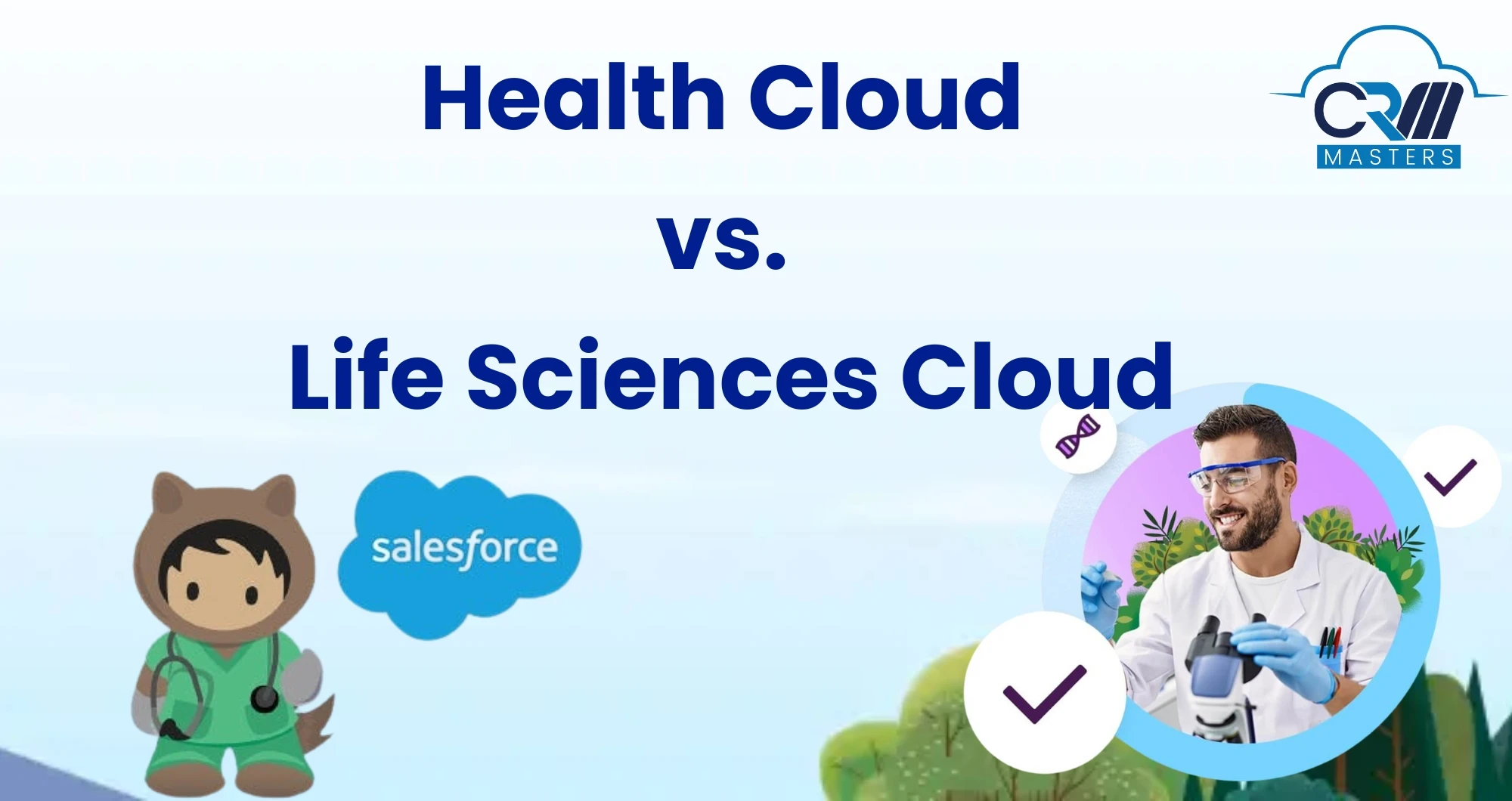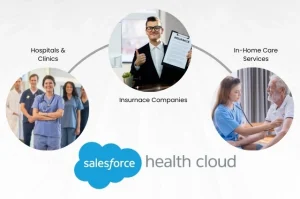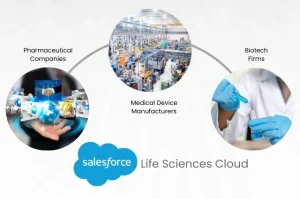
Salesforce Health Cloud vs. Salesforce Life Sciences Cloud
Salesforce, the world’s leading CRM platform, is renowned for offering customized solutions for various industries. Among its many offerings, Salesforce provides two powerful solutions, especially for the healthcare sector: Salesforce Health Cloud and Salesforce Life Sciences Cloud. While both are built on the Salesforce platform, they serve different purposes and target distinct audiences within the healthcare ecosystem.
In this blog, we’ll explore the differences between the two and help you understand which one may be better suited for your needs.
What is Salesforce Health Cloud?
Salesforce Health Cloud is a feature-rich CRM made especially for patients, payers, and healthcare providers. By providing a complete picture of a patient’s health, expediting care coordination, and promoting greater patient involvement, it aims to improve patient care.
Healthcare businesses can use their solutions to manage patient connections, enhance results, and provide individualized experiences while making sure that data is safe and complies with legal requirements.
Key Features of Salesforce Health Cloud
1. Patient 360
Health Cloud provides a complete view of patient data, including clinical information, medical history, and lifestyle details. This helps healthcare providers offer more personalized care.
2. Care Coordination
It enables care teams to collaborate efficiently, ensuring that patients receive coordinated care across multiple providers and departments.
3. Patient Engagement
With tools like patient portals and mobile apps, patients can engage more actively in their healthcare journey. They can book appointments, track their health metrics, and communicate with healthcare providers directly.
4. HIPAA Compliance
Salesforce Health Cloud is designed to comply with the Health Insurance Portability and Accountability Act (HIPAA), which ensures patient data is protected and handled securely.
5. Integration with EHRs
The platform integrates seamlessly with Electronic Health Records (EHR) systems, allowing providers to access up-to-date patient data and make more informed decisions.
Use Cases for Salesforce Health Cloud

-
Hospitals and Clinics
Healthcare facilities can streamline care coordination, manage patient records, and enhance patient care, resulting in better health outcomes.
-
Payers (Insurance Companies)
Insurance companies can track member data, improve customer engagement, and manage claims more effectively.
-
Home Healthcare
For home healthcare providers, Salesforce Health Cloud enables the management of in-home care services, helps track patient progress, and coordinates care among multiple providers.
What is Salesforce Life Sciences Cloud?
Salesforce Life Sciences Cloud is tailored for pharmaceutical companies, biotech firms, and medical device manufacturers. Unlike Health Cloud, which focuses on patient care and provider coordination, Life Sciences Cloud is designed to help companies manage the entire lifecycle of medical products, from clinical trials and regulatory compliance to engaging healthcare professionals (HCPs) and launching new drugs or devices.
Key Features of Salesforce Life Sciences Cloud:
1. Clinical Trials Management
Life Sciences Cloud provides tools to track clinical trials, manage participants, and ensure regulatory compliance throughout the process.
2. Healthcare Professional (HCP) Management
This feature allows companies to manage relationships with healthcare professionals, track interactions, and ensure compliance with regulations regarding marketing and sales.
3. Regulatory Compliance
Life Sciences Cloud includes built-in features to help companies stay compliant with global regulatory standards like FDA guidelines and EU Medical Device Regulation (MDR).
4. Product Lifecycle Management
This tool helps companies manage everything from R&D to the launch and post-market surveillance of medical products and devices.
5. Sales and Marketing Automation
Life Sciences Cloud provides field sales teams with real-time data to manage healthcare professional relationships, track market trends, and streamline marketing efforts while ensuring compliance with regulations.
Use Cases for Salesforce Life Sciences Cloud

-
Pharmaceutical Companies
Helps manage relationships with healthcare providers, track clinical trials, and ensure compliance during product launches.
-
Medical Device Manufacturers
Manages the product lifecycle, from research and development to market launch and monitoring after release.
-
Biotech Firms
Supports clinical research, regulatory collaboration, and manage key opinion leader (KOL) relationships in the biotech field.
Life Sciences Cloud vs. Salesforce Health Cloud: Key differences
While both Salesforce Health Cloud and Life Sciences Cloud are essential in the healthcare space, they differ significantly in their core functions, target audiences, and use cases. Let’s explore some of these key differences:
1. Target Audience:
Health Cloud: Primarily designed for healthcare providers (like hospitals and clinics), payers (insurance companies), and patients. It focuses on improving patient care, care coordination, and patient engagement.
Life Sciences Cloud: Aimed at pharmaceutical companies, biotech firms, and medical device manufacturers. It focuses on managing the product lifecycle, clinical trials, and engaging healthcare professionals.
2. Core Functionality:
Health Cloud: Centres around managing patient health data, coordinating care among providers, and engaging patients to improve health outcomes. It focuses on improving the patient experience and healthcare delivery.
Life Sciences Cloud: Focuses on managing medical products from R&D to market launch and post-market monitoring. It also ensures compliance with strict regulatory standards in the life sciences industry.
3. Compliance Requirements:
Health Cloud: Complies with healthcare-specific regulations like HIPAA in the U.S., which ensures patient data security and privacy.
Life Sciences Cloud: Ensures compliance with regulations like FDA guidelines, European Medical Device Regulations (MDR), and other global standards essential in the life sciences industry.
4. Sales and Marketing:
Health Cloud: While it has tools for patient engagement, sales and marketing are not central features in this cloud solution.
Life Sciences Cloud: It includes advanced sales and marketing tools, enabling field reps to manage healthcare professional relationships, streamline product launches, and adhere to strict marketing regulations.
5. Clinical Trials:
Health Cloud: Not designed to manage clinical trials. Its primary purpose is to enhance patient care through better coordination and engagement.
Life Sciences Cloud: Offers specialized tools to track and manage clinical trials, ensuring compliance and efficiency throughout the process.
Also Read: Effective Marketing Strategies in the Healthcare Industry for 2024
Choosing the Right Cloud Solution with CRM Masters
Both Salesforce Health Cloud and Life Sciences Cloud are powerful solutions built on the Salesforce platform, but their use cases cater to different segments of the healthcare ecosystem. It’s better to connect with a Certified Salesforce Implementation Partner for a better understanding and decision-making.
Salesforce Health Cloud is best suited for healthcare providers, payers, and patients who need to improve care coordination, engage patients, and manage health data effectively. It’s the right choice for organizations looking to enhance patient experiences and improve health outcomes.
Salesforce Life Sciences Cloud is designed for pharmaceutical, biotech, and medical device companies looking to manage the lifecycle of their products, from clinical trials to market launches. It’s perfect for organizations needing tools to track regulatory compliance and engage healthcare professionals effectively.
When deciding between the two, consider whether your primary focus is on improving patient care and engagement (Health Cloud) or managing the lifecycle of medical products and navigating regulatory challenges (Life Sciences Cloud).
If you’re uncertain about which cloud solution is right for your business, or need help with Salesforce implementation services, reach out to CRM Masters to get expert guidance and support.
Book your free consultation call now!












